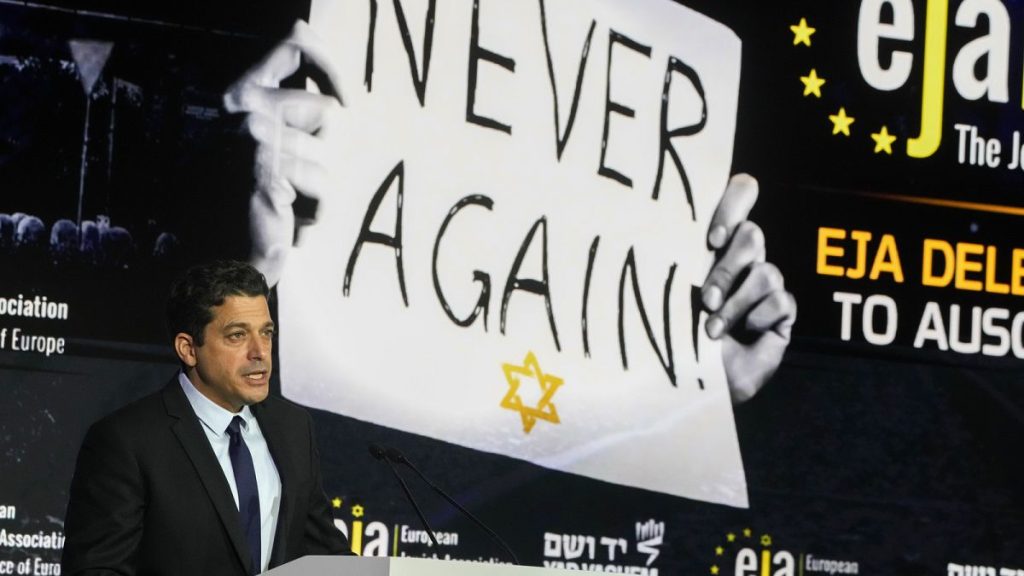The planned participation of Israeli Diaspora Affairs Minister Amichai Chikli in a European Parliament Holocaust remembrance event has sparked a significant outcry from relatives of Israeli hostages held by Hamas and Jewish community leaders. A letter signed by over 40 relatives and 32 Jewish leaders, addressed to the event organizers, MEPs Lukas Mandl and Andrey Kovatchev, vehemently opposes Chikli’s presence, labeling him an “inappropriate representative” due to his controversial political stances and associations. The letter specifically highlights Chikli’s opposition to the hostage-ceasefire deal that secured the release of some captives, his public endorsements of far-right European politicians, and his inflammatory rhetoric advocating for population displacement, which the signatories equate to support for ethnic cleansing. They argue that his inclusion in the event undermines the event’s purpose, jeopardizes the credibility of the European Parliament’s efforts against antisemitism, and dishonors the memory of the Holocaust.
The letter details Chikli’s opposition to the hostage-ceasefire agreement, a delicate negotiation that resulted in the phased release of Israeli hostages captured by Hamas during the October 2023 conflict. Chikli’s rejection of the deal, which aimed to secure the freedom of captured Israelis, is seen by the signatories as a stark disregard for the well-being of the hostages and their families. This stance, they assert, directly contradicts the principles of compassion and unity that should underpin such sensitive matters and further disqualifies him from representing Israel at an event commemorating the victims of the Holocaust.
Adding to the concerns is Chikli’s open support for prominent far-right figures in Europe, including Marine Le Pen of France and Calin Georgescu of Romania. The letter emphasizes the danger of legitimizing such ideologies, which often espouse xenophobia, nationalism, and intolerance. The inclusion of a minister who openly aligns himself with such figures at a Holocaust remembrance event, the signatories argue, risks normalizing dangerous ideologies and contradicts the event’s aim of combating antisemitism and promoting tolerance. This association, they believe, sends a troubling message and undermines the credibility of the European Parliament’s commitment to fighting hatred and discrimination.
Further fueling the opposition to Chikli’s participation are his public pronouncements regarding the displacement of populations in Gaza and southern Lebanon. The letter describes these statements as advocating for ethnic cleansing, a grave accusation that underscores the deep concern over Chikli’s rhetoric. His words, the signatories argue, incite division and hatred, principles diametrically opposed to the values of remembrance and reconciliation that the Holocaust remembrance event should embody. They contend that by giving Chikli a platform, the European Parliament risks inadvertently endorsing such inflammatory rhetoric and undermining its own efforts to foster peace and understanding.
The signatories express their disappointment and frustration that the European Parliament, a body dedicated to upholding human rights and combating prejudice, would consider hosting a speaker with such a controversial record. They argue that Chikli’s presence at the event overshadows its vital message and detracts from the important work of remembering the Holocaust and fighting against antisemitism. The letter calls upon the organizers to reconsider Chikli’s invitation and choose a speaker who truly represents the values of tolerance, respect, and remembrance.
The letter, copied to European Parliament President Roberta Metsola and the chairman of the European People’s Party, underscores the gravity of the situation and the importance of upholding the principles of the Holocaust remembrance event. The signatories’ plea for reconsideration serves as a stark reminder of the need for sensitivity and careful consideration when selecting speakers for such significant events. They believe that the choice of speaker should reflect the values of the event and contribute to its overall message of remembrance, reconciliation, and the fight against hatred. The controversy surrounding Chikli’s invitation highlights the tension between political considerations and the ethical responsibility to ensure that events commemorating the Holocaust maintain their integrity and purpose.














